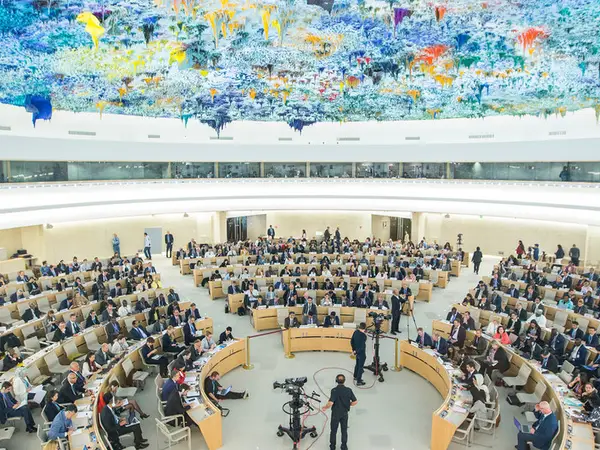UN rights experts have expressed grave concern over Iran’s new draft hijab bill, with the first anniversary of Woman, Life, Freedom protests only two weeks away.
The legislation, crafted by a dozen hardline lawmakers after the full parliament declined to deliberate on it and assigned the responsibility to a smaller group, encompasses various penalties for women who appear in public without proper attire and complete headscarves.
Following the death of Mahsa Amini in police custody in September 2022, which led to nationwide anti-regime protests, the Iranian government temporarily relaxed its strict enforcement of hijab rules, with more women appearing in public wearing ordinary attire. However, since March, hardliners have intensified their rhetoric and actions to suppress women's defiance of hijab and regain lost ground. They have issued various instructions to government entities in this regard. The current hijab bill represents the culmination of their efforts to reestablish what they describe as "law and order."
“The draft law could be described as a form of gender apartheid, as authorities appear to be governing through systemic discrimination with the intention of suppressing women and girls into total submission,” the UN experts said on Friday. They emphasized that the proposed “Bill to Support the Family by Promoting the Culture of Chastity and Hijab” and existing restrictions are “inherently discriminatory” and may amount to gender persecution.
Iranian rights activists, some media outlets, former government officials and many commentators in Iran have been voicing their opposition to the new hijab law, which has not yet been officially promulgated.
In July, Sara Bagheri, a prominent attorney told local media that the bill violates individuals’ rights, including their right to security and will pose a threat to the reputation and dignity of thousands of women who want to choose their own style of clothing. She also questioned the heavy fines stipulated in the law and asked what would happen if a woman is unable or unwilling to pay.
The UN experts also stated, “The punishments include deprivation of a range of basic freedoms and social and economic rights, which will disproportionately affect economically marginalised women.”
Shima Ghousheh, a law expert, wrote in a commentary published by the reformist Etemad newspaper in July, "The country’s whole budget should be used to build prisons for women because many Iranians will not be able to pay these [heavy] fines and should be sent to prison." She pointed out that the punishments for unveiling or "improper" hijab are much heavier than those prescribed by law for financial crimes, including embezzlement and drug-related offenses.
The UN experts who issued the statement against the hijab law include Javaid Rehman, Special Rapporteur on the situation of human rights in Iran, several other UN special rapporteurs, and members of Working group on discrimination against women and girls.
“The weaponisation of “public morals” to deny women and girls their freedom of expression is deeply disempowering and will entrench and expand gender discrimination and marginalisation, with wider negative consequences for children and society as a whole,” the experts said.
“We urge authorities to reconsider the compulsory hijab legislation in compliance with international human rights law, and to ensure the full enjoyment of human rights for all women and girls in Iran,” the experts told the Islamic Republic of Iran.
